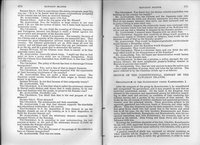674-675
| Previous Page | Next Page |

|
Senator Gray. I find in your history the closing paragraph, page 311, you say: "It is to be feared that the recent extraordinary prosperity of the country has not been an unmixed blessing."
Mr. Alexander. I freely agree with that.
Senator Gray. And so far you agree with Mr. Blount?
Mr. Alexander. Yes; the tendency to large estates is not very good; I do not like the system of labor; but it dates back beyond the reciprocity treaty.
The Chairman. Do you think the incoming of Chinese, Japanese, and Portuguese laborers into Hawaii is really a threat against the preservation and prosperity of the Kanaka race?
Mr. Alexander. I think it is injurious. For example, the mass of the Chinese and a majority of the Japanese are unmarried men. That increases the great disproportion between males and females in that country. The Chinese particularly set up little shops all over the country and sell liquor and opium when they can get customers—sell it on the sly, and do a great deal to demoralize the natives.
Senator Butler. Do the Chinese come there to remain or do they generally return home?
Mr. Alexander. Generally return home. I might say that on that point we have a pretty strict law on Chinese immigration. Since 1876 the Chinese have diminished from 23,000 down to less than 14,000—13,000 now.
The Chairman. The policy of Hawaii has been to discourage Chinese immigration?
Mr. Alexander. Yes; and in lieu of that to import Japanese.
The Chairman. Are those Japanese imported with the expectation of their becoming inhabitants of the country?
Mr. Alexander. They are under a three years' contract. The Japanese consul retains three-fifths of their wages to furnish them money to go home.
Senator Butler. Is not that because of this reciprocity treaty?
Mr. Alexander. Yes.
The Chairman. Is it true that what is called the missionary element in Hawaii really desires, and shows that it really desires, by its conduct and dealings with the people, to preserve the Kanaka race?
Mr. Alexander. Decidedly; yes.
The Chairman. You think that that is the real purpose of that element?
Senator Gray. What element?
The Chairman. The missionaries and their associates.
Mr. Alexander. I say that that element supports the charitable and educational institutions of the country.
The Chairman. Is it the disposition of that element to see the Kanaka element go out of the country, or is it their disposition to build the Kanaka element up?
Mr. Alexander. I think the missionary element comprises the strongest friends of the Kanakas.
The Chairman. Is it, according to your understanding, the real purpose or desire on the part of the missionary element to build up and sustain the Kanaka element?
Mr. Alexander. Yes, it is.
The Chairman. Was that the cause of the passage of the restrictive laws on Chinese immigration?
Mr. Alexander. That was one cause.
|
The Chairman. You found that the foreign oriental population was building up the country too rapidly?
Mr. Alexander. Yes; the Chinese and the Japanese, come into competition with the white and Kanaka mechanics and shop keepers. They do not remain laborers; they serve out their contracts and try to make a living in some other way.
The Chairman. Suppose the reciprocity treaty were continued with all the benefits which were had before the arrival of the McKinley bill, which you say was a blessing in disguise to the Kanaka people----
Mr. Alexander I suppose many disagree with me about that.
The Chairman. Suppose that condition of things would produce a continuous supply of Oriental people as laborers, what would be the ultimate result of that on the Kanaka people?
Mr. Alexander. They would be displaced gradually and the islands would become a Mongolian colony.
The Chairman. And the Kanakas would disappear?
Mr. Alexander. They would decrease.
The Chairman. There is a decrease there, and you think the ultimate effect would be the disappearance of the Kanakas?
Mr. Alexander. Yes; the liquor and demoralization would hasten the decline of the Kanaka race.
The Chairman. Is there not a purpose, a policy, amongst the missionary element, the more enlightened property-holding element in Hawaii, to prevent that result?
Mr. Alexander. Yes; they are very anxious to save the native race—have made sacrifices of money, time, and labor for the natives. The paper referred to by the Chairman awhile ago is as follows:
SKETCH OF THE CONSTITUTIONAL HISTORY OF THE HAWAIIAN ISLANDS.
Organization of the Government under Kamehameha I
After the conquest of the group by Kamehameha I, he consolidated and reorganized the government, and it may properly be said that an unwritten constitution existed. All the lands in the Kingdom were claimed by the conqueror and apportioned among his followers according to their rank and services, on condition of their rendering him military service and a portion of the revenues of their estates. He broke up the old system of district chieftains and appointed governors, kiaaina, over the principal islands. These governors, subject to his approval, appointed tax-collectors, heads of districts, and other petty officers. They also dispensed justice for their respective circuits. The four great Kona chiefs who had raised him to the throne and aided him in all his wars, viz, the twin brothers Kameeiamoku and Kamanawa, their half-brothers, Keeaumoku and Keaweaheulu, were his recognized counselors, and, with Kalanimoku, his treasurer, may be regarded as his cabinet. John Young and Isaac Davis also had great influence with him.
Knowing the worthless character of his heir, Liholiho, Kamehameha by his will, 1819, appointed Kaahumanu, his favorite queen, as kuhina nui, or premier, to exercise equal authority with Liholiho, with a power of veto on his acts.
A general council of chiefs was convened on several occasions, as when Liholiho left for England in 1823; again on the arrival of the news of his death in 1825, to settle the government, in order to make
| Previous Page | Next Page |